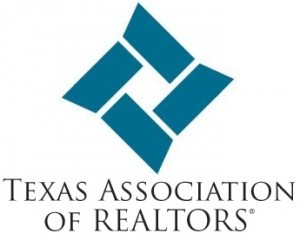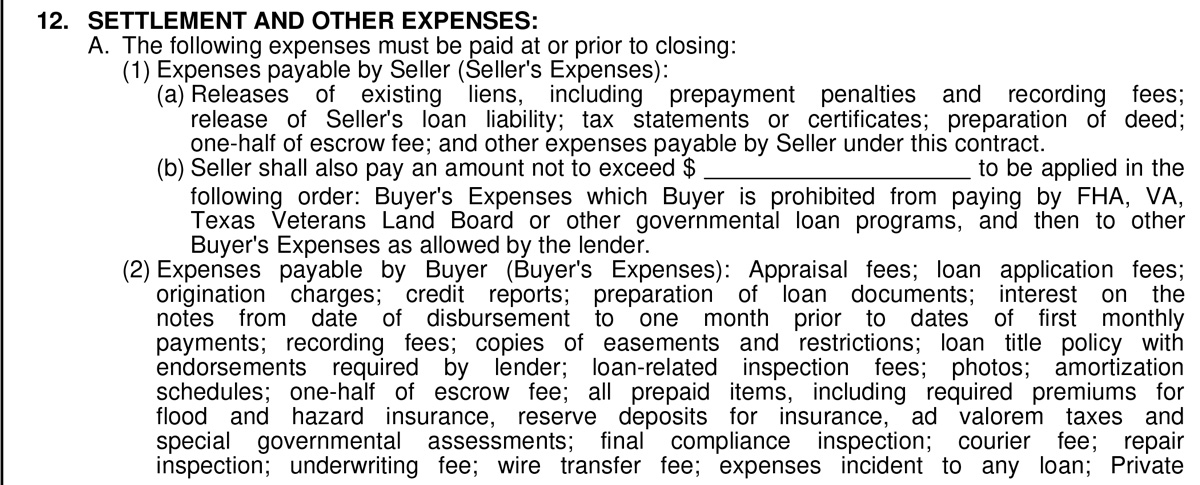 Note: The Texas Association of Realtors and TREC update promulgated forms regularly. For the most recent updates, check with TAR, TREC, or contact me at brian@starpointerealty.com.
Note: The Texas Association of Realtors and TREC update promulgated forms regularly. For the most recent updates, check with TAR, TREC, or contact me at brian@starpointerealty.com.
Note: I am a real estate professional, not a lawyer. Nothing herein should be construed as legal advice or instructions.
BLUF
- Your lender is the best point of contact to estimate closing costs; or title company if it is a cash deal.
- A Seller should get the Seller’s Estimated Net Proceeds document from their agent to estimate their fees.
- Remember for buyers, closing costs are in addition to your down payment – they don’t include your down payment (a seller can’t pay your down payment).
Welcome back! The previous paragraph was Paragraph 11: Special Provisions. Now we are on Paragraphs 12 and 13 having to do with closing costs and who pays what for all the fees involved in selling a home. Which fees? Read to find out!
Paragraph 12.A.1. There are not a lot of inherent seller expenses, adding up to maybe a few hundred dollars in most transactions I’ve been a part of. Those expenses are specified in this part of the paragraph. The title company looks at this and knows who to charge for what on the final documents.
A Realtor can use the Seller’s Estimated Net Proceeds (TAR-1935) to estimate what the seller’s fees will be depending on the type of financing the buyer is expected to use (look here for the frequency of different loan types used in the Fort Hood area).
While there are not a lot of inherent seller expenses, the buyer can ask for the seller to pay a lot. In fact, it is common in the Fort Hood area for buyers to ask for just about everything – all their closing costs, the owner’s title policy, a new survey, and first year of a home warranty. What was a few $100s might now be $3000-$8000+.
If you are a buyer asking the seller to pay your closing costs, what number do you use? Ask your lender. Your agent should ask your lender as well. Often it is about 3% of the purchase price, but your lender can give you the most accurate recommendation on what to use.
Paragraph 12.A.2. These are the buyer’s expenses, many of which are the same expenses that they can negotiate the seller to pay in Paragraph 12.A.1 above. Usually, the buyer’s expenses are far greater than the seller’s expenses above. Again, a lender can recommend what number to use here.
For cash deals without a lender, I recommend going to the title company to estimate a cash buyer’s closing costs. A Realtor can also use the Approximation of Buyer’s Closing Costs (TAR-1936) to estimate a buyer’s closing cost expenses.
Paragraph 12.B. If an expense is more than was agreed, a party can split and run unless the other party is willing to pay the difference. I’ve never run into this. The only scenario I can think of here is if the lender’s origination fee exceeds whatever amount is agreed to in the Third Party Financing Addendum.
Paragraph 13. Taxes are paid in a lump sum once a year (in October). What if you could sell your property September 30th, have someone else pay the taxes, and then buy it back right after, right? You’d save $1000s! (See Killeen, Harker Heights and Copperas Cove tax information here).
No – because taxes are prorated – and they can make a huge difference on closing costs. As I mentioned, the OWNER pays taxes in October for the entire year, January 1st to December 31st. If you buy a home in September, you are about to get taxed for the whole year, including 9 months you didn’t even own it. Except the seller will pay you the prorated tax amount at closing for the months they owned it.
Meanwhile, if you are buying in November, the seller has already paid the taxes for the whole year, meaning you OWE the seller money for the two months they’ve already paid your taxes. The closing costs are lowest for buyers in September and before taxes are paid in October, and highest in the months after until the new year.
It’s weird and math-y and confusing, and again, it is best to rely heavily on a quality lender or title company to estimate your closing costs depending on your closing date.
Come with me next time and keep me awake for Paragraphs 14 through 21: The Boring Legal Stuff! (Of course I kid – contracts are never boring!)
Questions about who pays what? Share below so everyone can see!



